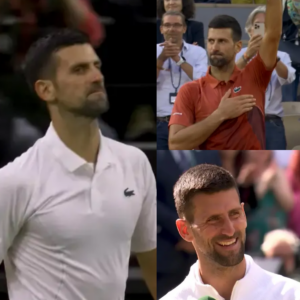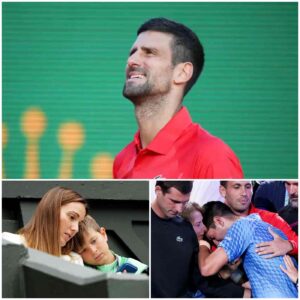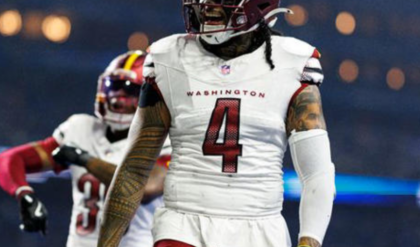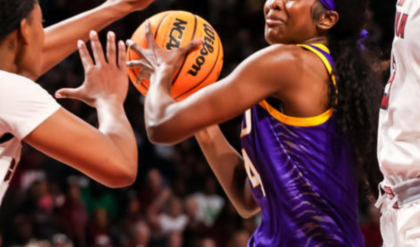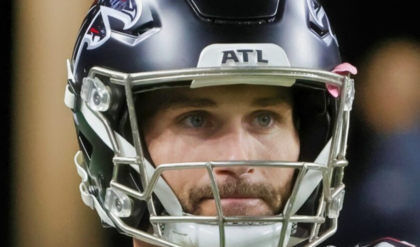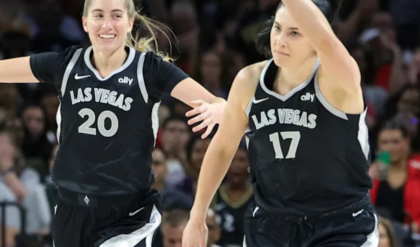Caitlyn Clark’s rise to prominence has been nothing short of meteoric, and her recent recognition as Time’s Athlete of the Year has sparked a debate that has captivated the sports world. On one hand, her groundbreaking achievements on the court have brought attention to women’s basketball in a way that has not been seen before. On the other, a storm of criticism has surrounded the award, with detractors accusing her of overshadowing the collective efforts of the WNBA and questioning her privilege. What followed was a wave of support from across the sporting community, as athletes and sports figures rallied behind Clark, defending her honor and shining a light on the bigger picture of women’s sports.

When Time Magazine announced Clark as Athlete of the Year, it seemed like a well-deserved acknowledgment of her talent, work ethic, and transformative impact on women’s basketball. However, the moment of celebration was soon overshadowed by a chorus of criticism. Some felt that the focus on Clark was unjust, believing that the collective success of the WNBA should have been highlighted instead. Sheila Johnson, co-owner of the Washington Mystics, raised the question of why the entire league wasn’t recognized for its success, suggesting that the honor should have gone to the WNBA as a whole, rather than one player. This argument, while rooted in a desire for collective recognition, failed to recognize Clark’s singular role in driving visibility and interest in the sport.
Critics like Megan Kelly accused Clark of “bending the knee” to certain institutions, further escalating the narrative of division within women’s sports. However, this narrative was met with sharp responses from both fans and fellow athletes, including Olympic gold medalist Gabby Thomas. Thomas took to social media to defend Clark, expressing her frustration at the public criticism and standing by Clark’s right to acknowledge her privilege while still celebrating her achievements. Thomas’s response underscored a growing solidarity among athletes from various sports, a movement that has seen women in different disciplines supporting one another, rather than competing for attention.
Adding fuel to the fire, tennis legend Chris Evert joined the conversation, calling out those who criticized Clark’s individual recognition. Evert, whose career was marked by individual excellence and fierce competition, defended Clark, emphasizing that the athlete of the year title is meant to honor individual achievement, not necessarily to promote the collective achievements of a league or team. Evert’s support was not just for Clark as a basketball player but for the broader message of individual excellence in team sports.
Even Ryan Clark, a former NFL player and sports analyst, weighed in on the controversy, adding his voice to the defense of Caitlyn Clark. On his podcast, Clark praised Clark’s handling of criticism, pointing out her self-awareness and ability to block out the noise while maintaining her focus on elevating the sport. Clark’s praise for Caitlyn went beyond basketball, acknowledging her as a role model who has redefined what it means to be a female athlete in a male-dominated sports world. For Ryan Clark, Caitlyn Clark’s impact transcends the game of basketball and reaches into the very fabric of what it means to be a trailblazer in sports.

However, the backlash against Caitlyn Clark didn’t stop with sports analysts or former players. Barstool Sports founder Dave Portnoy also entered the fray, expressing his admiration for Clark’s game and slamming those who accused her of betraying anyone by acknowledging her privilege. Portnoy’s passionate defense of Clark highlighted the hypocrisy in the criticisms, pointing out that Clark’s success is a direct result of her talent and hard work, not her race or background. He called out fans who claimed to support her but criticized her for speaking on her privilege, urging them to recognize the significance of her achievements rather than focusing on trivial distractions.
Meanwhile, another rising star in the world of sports, tennis phenom Coco Gauff, quietly showed her support for Caitlyn Clark with a simple but meaningful gesture. Gauff, who has become a household name in tennis at the young age of 19, posted a series of heart-eye emojis in support of Clark on Instagram. While this might seem like a small gesture, it speaks volumes about the solidarity among young female athletes who are reshaping the landscape of sports. Gauff’s admiration for Clark has been evident for years, and her recent display of support is part of a growing movement where athletes from different disciplines come together to uplift one another.
Adding a unique perspective to the discussion, Alexis Ohanian, husband of tennis legend Serena Williams and a tech entrepreneur, entered the conversation to defend Clark. Ohanian, known for his outspoken support of women’s sports, took to Twitter to praise Clark’s achievements, while acknowledging her awareness of privilege. Ohanian’s support carries weight, not only because of his marriage to one of the greatest athletes of all time, but also due to his influence as a Silicon Valley mogul. He emphasized that it is possible to celebrate excellence while also acknowledging the challenges that come with privilege, highlighting Clark’s ability to navigate both with grace and humility. Ohanian’s words added a new layer to the conversation, showing how different sectors of society—sports, tech, and social advocacy—are intersecting in the fight for women’s recognition in sports.
Finally, the discussion was rounded out by veteran sports journalist Christine Brennan, whose decades of experience in covering the biggest names in sports gave her a unique perspective on the controversy surrounding Caitlyn Clark. Brennan, during an appearance on CNN, firmly defended Clark’s right to be recognized for her individual achievements. She pointed to the skyrocketing TV ratings and the packed arenas as evidence of Clark’s impact, noting that the young player’s influence has brought new fans and increased visibility to the sport. Brennan also made it clear that the recognition of individual players does not diminish the collective achievements of the league or the team.
The debate surrounding Caitlyn Clark’s recognition as Time’s Athlete of the Year is far from over. As athletes, journalists, and fans continue to weigh in on the issue, one thing is clear: Caitlyn Clark has become a symbol for a new era in women’s sports. Her achievements are a testament to the power of individual excellence and the importance of supporting women in all fields. As the conversation evolves, it is clear that Caitlyn Clark is more than just a basketball player—she is a cultural force, reshaping the narrative around women’s sports and proving that a rising tide lifts all boats.
News
Novak Djokovic experiences his first sub-top-250 defeat since 2010!
Numbers do not always give the correct information! We saw that on Friday at the Brisbane International when world no. 293 Reilly Opelka stunned the 24-time Major winner, Novak Djokovic. Reilly ousted his idol 7-6, 6-3 in an hour and…
‘Novak Djokovic will challenge Sinner, Zverev, Alcaraz,’ says Musetti
After many notable years at Majors, Novak Djokovic did not lift a notable trophy in 2024. The 24-time Major champion is alone at the top, leaving Rafael Nadal at 22 following a stellar performance in 2023. Despite that, Djokovic is…
Novak Djokovic tips his hat to Reilly Opelka after Brisbane defeat
Novak Djokovic kicked off the new season at the ATP 250 event in Brisbane. The Serb competed at this event for the first time since 2009 and failed to chase the milestone 100th ATP title. Novak suffered a 7-6, 6-3…
Novak Djokovic And Mother Jelena’s Reaction Was Surprising.
Novak Djokovic, the Serbian tennis superstar, is a name that resonates worldwide, not only for his incredible achievements on the court but also for his remarkable persona off it. Djokovic has long been an open book about his personal life,…
“WHAT I NEED MOST NOW IS REST” Djokovic Suddenly Made A Shocking Statement At The End Of His Career.
Novak Djokovic, one of the greatest tennis players of all time, recently made headlines with a startling admission regarding his future in the sport. As he nears the end of an illustrious career that has seen him secure numerous Grand…
Nadal Breaks Down in Tears as His Wife and Son Visit Him on His Final Tour: ‘He Missed His Father’.Details In The Comments 👇👇
In the world of professional sports, moments of pure emotion often surface, revealing the human side of athletes who are usually seen as invincible figures. One such touching moment came recently involving tennis legend Rafael Nadal. Known for his relentless…
End of content
No more pages to load

